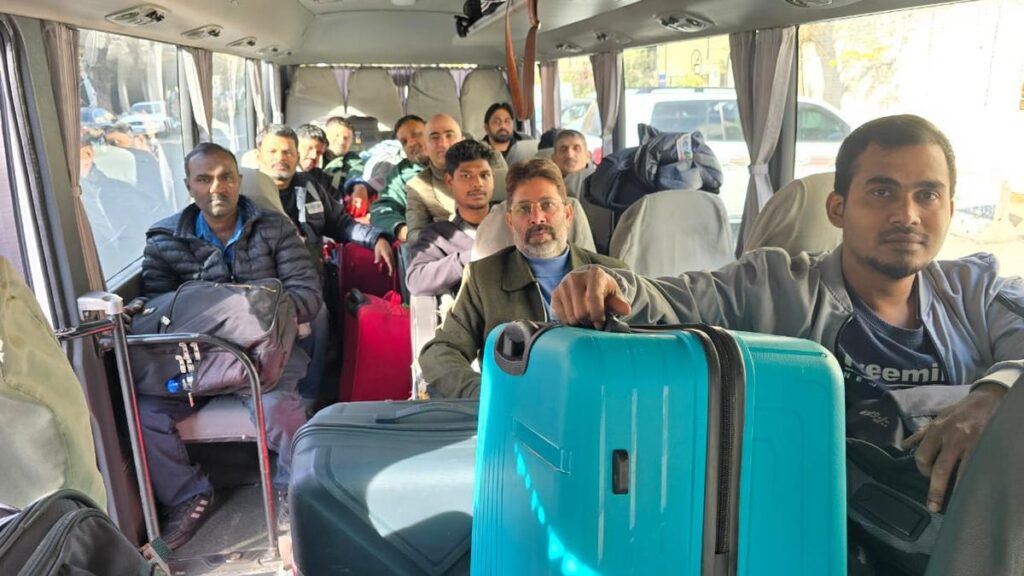New Delhi, December 11, 2024
The global Evacuations from Syria has brisk started and many countries have rallied to evacuate its citizens from Syria after rebel forces overthrew President Bashar Assad’s government on December 8, 2024. The swift political changes have created a volatile environment, forcing countries to act urgently to ensure the safety of their nationals. India, along with several other nations, has successfully evacuated hundreds of citizens amid escalating uncertainty.
India’s Coordinated Efforts for Evacuations from Syria Effort:
India successfully evacuated 75 citizens on December 10, 2024, demonstrating its commitment to safeguarding its nationals in conflict zones. The evacuation, overseen by the Ministry of External Affairs (MEA) and coordinated by Indian embassies in Damascus and Beirut, was conducted after a comprehensive security assessment.
“All evacuees have safely crossed into Lebanon and will return to India via available commercial flights,” the MEA confirmed in a statement. The group included 44 pilgrims from Jammu and Kashmir who were stranded in Saida Zainab, a suburb near Damascus. The MEA emphasized that the safety of Indian nationals remains the government’s highest priority and reassured that it is monitoring the evolving situation in Syria closely.
India’s swift action highlights its robust crisis management system and efficient coordination with neighbouring countries, showcasing its ability to navigate complex geopolitical challenges while prioritizing citizen welfare.
Global Responses to the Crisis
India is not alone in its efforts to rescue citizens. Several other nations have launched similar operations:
- Spain evacuated 26 individuals, including seven Spanish nationals, 16 dual Spanish-Syrian citizens, and three Syrian relatives. Due to the closure of Damascus International Airport, the evacuation was conducted overland to Lebanon. Spanish embassy staff coordinated the safe passage of evacuees, who were later received in Beirut by officials.
- Iran announced the successful repatriation of 4,000 citizens from Syria over three days. The large-scale operation underscores Tehran’s proactive measures to ensure the safety of its nationals, given its close ties to the region.
- Pakistan is preparing to evacuate its citizens through an action plan directed by Prime Minister Shehbaz Sharif. Authorities have been instructed to use all available resources to facilitate the safe return of Pakistani nationals from Syria via neighbouring countries.
- Italy faced a unique challenge as Syrian rebels entered the residence of the Italian ambassador in Damascus. Fortunately, the ambassador and his staff were unharmed. The Italian government has called for a peaceful transition of power and continues to monitor the safety of its citizens in the region.
The Ongoing Challenge
While these evacuation efforts are commendable, thousands of foreign nationals remain in Syria, awaiting rescue. The uncertain political landscape and logistical challenges, such as closed airports and disrupted communication lines, complicate evacuation efforts.
India has not disclosed the exact number of citizens still stranded in Syria. However, the MEA has assured that it remains in touch with all Indian nationals in the region and will take further steps as required. Meanwhile, countries like Pakistan and Spain are still formulating strategies for citizens who may wish to leave.
The broader evacuation effort underscores the importance of international cooperation during crises. Nations are relying on partnerships with neighbouring countries like Lebanon to facilitate safe crossings and ensure swift exits from conflict zones.
Humanitarian Concerns in Syria
The power vacuum created by Assad’s ousting has led to widespread instability, sparking fears of a prolonged humanitarian crisis. Civilians, including foreign nationals, face risks from potential violence, food shortages, and limited access to medical care.
The United Nations and other international organizations have called for restraint and the establishment of a transitional government to stabilize the region. Countries with diplomatic missions in Syria are coordinating closely to manage both humanitarian aid and evacuation logistics.
A Unified Global Effort
As countries continue their rescue operations, the situation in Syria remains fluid. The collaborative efforts of nations to evacuate their citizens reflect a shared commitment to ensuring safety and stability during times of crisis. However, the road ahead remains challenging, with ongoing uncertainties about the region’s future.
India’s proactive approach, alongside similar actions by nations like Spain, Iran, and Pakistan, demonstrates the resilience of global diplomacy in the face of adversity. The international community’s ability to act decisively underlines the importance of preparedness and cooperation in managing crises of this magnitude.
For now, the focus remains on ensuring the safe return of all nationals while keeping a close watch on developments in Syria. As the world watches, these evacuation efforts serve as a testament to the power of coordinated action in protecting human lives amid chaos.





